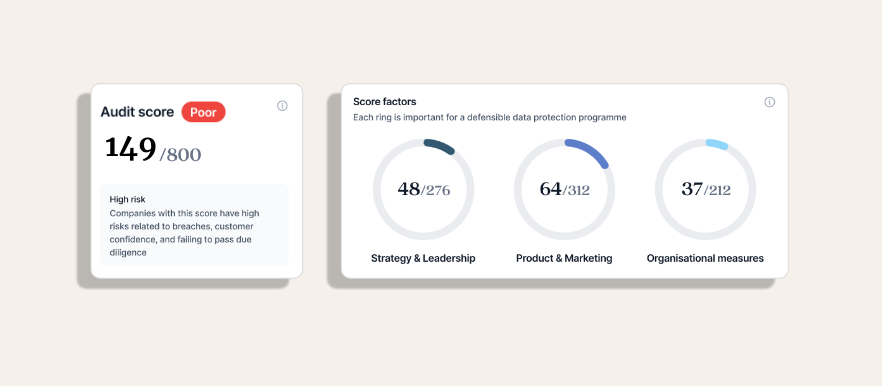What Tech Scale-ups Need To Do To Get Data Protection Right
In today's digital world, it is essential for tech scale-ups to prioritize Data Protection. Ensuring the security and integrity of customer data is not only a legal requirement but also a crucial aspect of building trust with your clients. In this blog, we will explore the key steps that tech scale-ups need to take to get Data Protection right and safeguard their business from potential threats.
In a recent webinar, we broke down what tech scale-ups have to do to get Data Protection right. You can watch the webinar here, or if you prefer, you can read this blog.
Your Data Protection Score
Here at Trust Keith, we approach Data Protection much like calculating a credit score. This score can help you assess the current state of your Data Protection practices and identify areas that need improvement. A Data Protection credit score is like a health check for your business, enabling you to gauge the effectiveness and compliance of your Data Protection measures and determine if they are sufficient to meet the evolving requirements.

Calculating your Data Protection credit score is not just a one-time exercise, but an ongoing process that allows you to continuously evaluate and enhance your Data Protection practices. It provides you with valuable insights into the strengths and weaknesses of your Data Protection infrastructure, helping you make informed decisions to safeguard your sensitive information and the rights of your Data Subjects.
When calculating your Data Protection credit score, it is important to consider various factors that contribute to Data Protection compliance. These factors include data collection methods, access controls, supplier management, incident response plans, and employee training programs. By assessing each of these areas, you can gain a comprehensive understanding of your Data Protection posture.
Moreover, calculating your Data Protection credit score allows you to benchmark your organisation against industry standards and best practices. This benchmarking process helps you identify any gaps in your Data Protection strategy and prioritize actions accordingly. It enables you to stay ahead of potential risks and ensure that your Data Protection measures align with the latest regulatory requirements.
Regularly monitoring your Data Protection credit score also allows you to track progress over time. By setting goals and objectives, you can measure your improvement in Data Protection practices and demonstrate to your stakeholders that you take data compliance seriously. This will enhance your reputation and build trust with your customers, partners, and investors.
Furthermore, calculating your Data Protection credit score can uncover hidden risks and vulnerabilities within your organisation. It provides you with a holistic view of your Data Protection landscape, enabling you to identify potential weak points and risks, and take proactive measures to mitigate them. By addressing these risks, you can reduce the likelihood of data breaches and the associated financial and reputational damage.
In conclusion, calculating your Data Protection credit score is a crucial step for any tech scale-up. It not only helps you assess your current Data Protection practices but also provides a roadmap for improvement. By continuously monitoring and enhancing your Data Protection measures, you can ensure the integrity and compliance of your sensitive information, while also demonstrating your commitment to Data Protection to your stakeholders.
Developing a Plan to Achieve Data Protection Goals
Once you have assessed your Data Protection credit score, the next step is to develop a comprehensive plan to achieve your Data Protection goals. Start by identifying the specific areas where your Data Protection measures need improvement.
When developing your plan, it is important to take into account the unique challenges and requirements of your organisation. For example, if you handle sensitive customer data, you may need to comply with industry-specific regulations such as the General Data Protection Regulation (GDPR) or the Health Insurance Portability and Accountability Act (HIPAA).
One effective strategy for achieving Data Protection goals is to educate and train your employees. Human error is one of the leading causes of data breaches, so it is crucial to ensure that your staff are well-informed about best practices for Data Protection. This can include training sessions, workshops, and regular reminders about the importance of Data Protection.
Furthermore, consider conducting regular audits and assessments to evaluate the effectiveness of your Data Protection measures. This can help you identify any weaknesses, risks, or gaps in your Data Protection infrastructure and take appropriate action to address them. It is also important to stay up-to-date with the latest changes and developments in Data Protection, as technology, regulation, and threats are constantly evolving.
Additionally, your plan should include a data breach response strategy. Prepare for the worst-case scenario by designing a robust incident response plan that outlines the steps to be taken in the event of a data breach. This will enable you to respond quickly, mitigate the impact, and minimise the damage caused by a potential breach.
Remember, Data Protection is an ongoing process that requires continuous monitoring and improvement. By developing a comprehensive plan and implementing effective measures, you can safeguard your organisation's sensitive information and maintain the trust of your customers and stakeholders.
Incorporating Data Protection into Business Strategies
Building a culture of Data Protection within your organisation is crucial to ensure everyone understands and complies with Data Protection policies. Incorporate Data Protection as a core element of your business strategies, emphasising the importance of compliant and safe data management in all operations and processes.
Train your employees on Data Protection best practices, including how to handle sensitive data, recognise potential risks, and respond to data incidents. Regularly update training to keep up with the latest trends and techniques used by cybercriminals.
Furthermore, consider appointing a dedicated Data Protection Officer or team. Their role is to oversee and enforce Data Protection policies, manage data breaches, and provide ongoing guidance and support to ensure compliance with Data Protection regulations. Having a dedicated resource will demonstrate your commitment to Data Protection and provide a point of contact for any data-related concerns or queries.
Key considerations for B2B Companies
When it comes to B2B businesses, Data Protection becomes even more critical. For B2B businesses, evidence is absolutely key. Make sure you're documenting things early, make sure you're writing things down, and make sure you've got everything in place.
As a tech scale-up, you may be handling sensitive customer data, intellectual property, or trade secrets, which makes your Data Protection measures paramount.
Ensure that you have robust Data Protection agreements in place with your B2B partners, outlining responsibilities and expectations regarding data. Regularly review these agreements to ensure they remain up to date with evolving standards and legal regulatory requirements.
Conduct regular Data Protection audits and assessments of your B2B partners to ensure they adhere to your Data Protection standards. This will help identify any potential vulnerabilities or areas for improvement and enable you to address them proactively.
Above all the key thing to think about is evidence, evidence, evidence.
Can you prove that you're doing something? For everything that you do, evidence it, and if you don't have a policy in a certain area, and it's an important area, write a policy for it.
Key considerations for B2C businesses
Data Protection is also crucial when it comes to B2C companies. As a tech scale-up, your customers trust you with their personal information. To maintain this trust and ensure their data remains safe, consider the following key considerations.
Implement clear and transparent privacy policies that clearly outline how you collect, store, and use customer data. Provide customers with an easy-to-understand explanation of their rights and the measures you have in place to protect their information.
Ensure that you have robust safeguards in place to protect customer data from unauthorized access. This includes encrypting sensitive information, implementing secure payment systems, and regularly monitoring your infrastructure for any suspicious activities.
In addition, be prepared to respond to customer concerns and inquiries about their data. Have a process in place to handle data subject access requests promptly and efficiently. Demonstrating a commitment to transparency and customer rights will further enhance trust and loyalty.
Why it's not just about ISO27001
While ISO27001 certification is a benchmark for Data Protection, it is essential to recognise that it is not the only aspect to consider. ISO27001 provides a framework for establishing an information security management system, but it does not cover all your Data Protection bases.
Compliance with ISO27001 should be viewed as a stepping stone, not the end goal. It is crucial to continually evaluate and enhance your Data Protection practices beyond the scope of ISO27001. Stay up to date with emerging technologies, evolving threats, and regulatory changes to ensure your Data Protection measures remain effective and aligned with industry best practices.
Remember, Data Protection is an ongoing process that requires constant monitoring, evaluation, and improvement to protect your business and maintain the trust of your customers.
In conclusion, tech scale-ups must prioritise Data Protection to safeguard their business and meet legal requirements. By calculating your Data Protection credit score, developing a comprehensive plan, incorporating Data Protection into business strategies, considering key considerations for B2B and B2C interactions, and recognising that ISO27001 is just a stepping stone, you can establish a strong foundation for Data Protection and build trust with your customers. Remember, protecting customer data is not only a legal obligation but also a fundamental aspect of business ethics and good corporate governance. Stay vigilant, adapt to evolving threats and risks, and make Data Protection a top priority to secure your competitive advantage in the digital era.
Need help getting started with Data Protection? Get in touch today.



-1.png?width=800&height=467&name=LI%20image%20%20(1)-1.png)